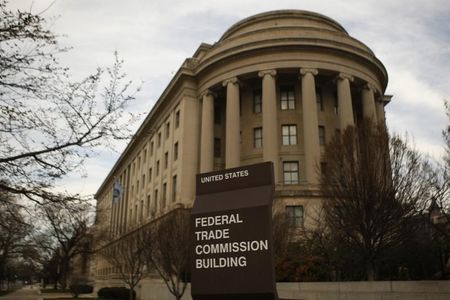Trump names Andrew Ferguson as FTC Chair. What are the Big Tech implications?
2024.12.15 04:58

Investing.com — President-elect Donald Trump has announced his intention to elevate current FTC Commissioner Andrew Ferguson to the role of Chairman, with the transition expected next month.
While Ferguson has signaled support for deregulatory policies, particularly in emerging areas like AI, his vocal skepticism toward major technology companies, including Meta (NASDAQ:), Google (NASDAQ:), Microsoft (NASDAQ:), Amazon (NASDAQ:), and Apple (NASDAQ:), stands out.
According to Ferguson, his priorities as Chair would include reversing many of the policies implemented under current FTC Chair Lina Khan.
Notably, he has stated he would “Stop Lina Khan’s war on mergers. Most mergers benefit Americans and promote the movement of capital that fuels innovation.”
On AI regulation, Ferguson has pledged to “end the FTC’s attempt to become an AI regulator.”
However, his deregulatory stance does not extend to Big Tech. Ferguson has promised to “Focus antitrust enforcement against Big Tech monopolies, especially those companies engaged in unlawful censorship.”
He has also committed to pursuing both structural and behavioral remedies under antitrust laws to prevent dominant platforms from using their market position to stifle competition and innovation.
Commenting on this, TD Cowen analysts suggest this could signal a continuation of significant FTC actions.
For example, Ferguson is expected to maintain the agency’s aggressive approach to the antitrust lawsuit against Amazon, with little likelihood of settling before the trial set for mid-2026.
“And if the FTC wins, his comments suggest he would seek a breakup,” analysts said.
Similarly, Ferguson is likely to sustain the ongoing investigation into Microsoft, which reportedly focuses on the company’s practices of potentially tying Azure revenue to Office365.
Meta is also expected to remain in the FTC’s crosshairs, with the agency continuing its uphill legal battle to force the divestiture of Instagram.
Ferguson may also pursue Meta and Google over allegations of censorship, referencing a 2020 executive order directing the FTC to examine “unfair or deceptive acts or practices” related to speech moderation by Section 230-covered entities.
“In other words, even 230-protected content might be found unlawful by the FTC,” analysts noted.
Another area of focus could be generative AI mergers and acquisitions (M&A). Ferguson’s comments raise questions about whether the largest tech firms will face heightened scrutiny in their attempts to acquire pieces of the generative AI ecosystem.
This could complicate efforts by tech giants to leverage M&A as a strategy to manage risks and maximize opportunities in the rapidly growing field.








